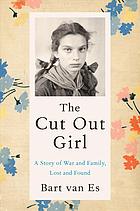
The Cut Out Girl
A Story of War and Family, Lost and Found
کتاب های مرتبط
- اطلاعات
- نقد و بررسی
- دیدگاه کاربران
نقد و بررسی

June 11, 2018
Literature professor van Es (Shakespeare in Company) thoughtfully examines a dark chapter in the Netherlands’ past in this look at the life of Lien de Jong, a Dutch Jew who was hidden from the Nazis by van Es’s grandparents before a rift developed between Lien and them. Van Es’s account is based both on interviews with Lien, whom he met when she was in her 80s, and his reconstruction of events. A year after Holland was invaded by Germany in 1940, Jews were barred from using public places such as parks, libraries, and museums. In 1942, when Jews were required to wear a yellow star to identify themselves, and with the then-eight-year-old Lien the target of other children’s increasing anti-Semitism, her mother took the desperate step of putting her into an underground network of foster families, who placed her with van Es’s grandparents, Jan and Henk. Van Es makes Lien’s childhood palpable by including photographs, excerpts from a poetry scrapbook she’d kept, and the poignant letter her mother wrote to her protectors (“Most Honored Sir and Madam, Although you are unknown to me, I imagine you for myself as a man and a woman who will, as a father and mother, care for my only child”). He also uncovers long-buried secrets relating to the rift between Lien and his grandparents, which was still unhealed when Jan and Henk died. This is a nuanced, moving, and unusual “hidden child” account.

July 1, 2018
Van Es (English, Univ. of Oxford; Shakespeare's Comedies) reveals the story of his grandparents Jans and Henk van Es, who sheltered a Jewish girl named Lien during World War II in the Netherlands. Lien's parents placed her in hiding with the family before they themselves were captured, and although Lien was relatively happy in her new home, looming discovery meant she was shuttled throughout several other households, suffering mistreatment and abuse. Eventually, she returned to the van Es home, where she spent the rest of her youth. Then a small disagreement caused Jans to sever ties with her adopted daughter. Years later, Lien attended a memorial service for her parents at Auschwitz, "And I want to tell you...I missed them the rest of my life." But which parents does she mean? Using his scholarly background, van Es pieces together historical and contemporary resources in a dual narrative. Although the contemporary time line is less engaging, Lien's story is simultaneously sad and uplifting. VERDICT One girl's wartime experience encapsulates the traumatic experience of many. The level of documentation presented is appropriate for research or simply enriching reading.--Jessica Bushore, Xenia, OH
Copyright 2018 Library Journal, LLC Used with permission.

July 1, 2018
A professor's story of how he found and befriended an estranged member of his extended family, a Jewish woman his grandparents had adopted during World War II.When van Es (English Literature/Univ. of Oxford; Shakespeare's Comedies: A Very Short Introduction, 2016, etc.) returned to his native Holland to meet Lien, an elderly Jewish woman, he knew only that she had grown up with his father as an adopted sister. Later--and very mysteriously--she had received a letter from the author's grandmother severing all connection to the family. Through correspondence and interviews, van Es learned that Lien's mother sent her daughter to live among Christians willing to protect her from the Nazis. For a year and a half, she lived quietly, missing the parents she never saw again but loving her adopted family. When the van Es home was raided by local Dutch authorities, Lien fled. For more than a year, she moved from hiding place to hiding place, focused solely on surviving. Eventually, she made her way to central Holland, where she spent the next year living with the stern Van Laar family and getting raped by the brother of her adopted father. When she returned to the van Es family in 1945, she had become a brooding teenager. She appeared to grow out of her unhappiness, training first to become a social worker, and then marrying and having children. Yet her "perfect" life did not stop her from later trying to commit suicide. The author's grandmother saw her behavior as selfish and put what would become a permanent distance between them. Unlike his grandmother, van Es saw that the trauma Lien endured had made her feel cut off from herself and Jewish heritage, like a "cut out" figure in someone else's culture and life. Compassionate and thoughtfully rendered, the book is both a memorable portrait of a remarkable woman and a testament to the healing power of understanding.A complex and uplifting tale.
COPYRIGHT(2018) Kirkus Reviews, ALL RIGHTS RESERVED.

























دیدگاه کاربران